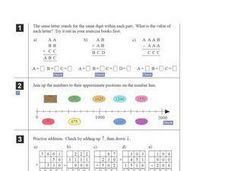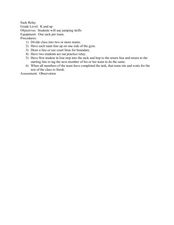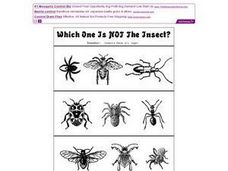Curated OER
Alligator Drawing
In this coloring worksheet, students examine a black line drawing of an alligator up on his hind legs. Students color the picture.
Curated OER
Connect the Dots: Meerkat
In this connect the dots worksheet, 1st graders will connect numbers 1 to 40 to reveal a picture of a mammal that is often seen standing on its hind legs: a meerkat.
Curated OER
Clothes and the Body
For this ESL clothes and the body worksheet, students read the names of 15 articles of clothing. Students categorize the clothes by putting them in groups according to where they are worn: feet, legs, arms, neck and head torso.
Curated OER
ESL: All About My Body
In this ESL body parts learning exercise, students look at 7 pictures of body parts, read a phrase, and decide if it is true or false. They read phrases such as "This is my leg," and decide if it is true or false.
Curated OER
Value of Letters and Number Lines
In this value of letters and number lines worksheet, students determine the value of letters in three math problems, place ten numbers on a time line, practice adding together ten addition problems and join eight calculations to their...
Curated OER
Shoomoos
In this reasoning worksheet, students are shown 2 pictures that are shoomoos, and 2 that are not. Students circle the shoomoo in each of 4 groups. Note: A shoomoo has 3 eyes and 3 legs.
Curated OER
Grade One Mixed Math Practice
In this grade one mixed math practice worksheet, 1st graders complete 7 problems. They work with money, number sentences, addition, subtraction, and number sentences. They count the number of legs on a picture of a lamb and work with a...
Curated OER
Gingerbread Math Glyph
For this math activity, learners follow the glyph directions to decorate the gingerbread man pattern. They make eye, feet, a mouth, and legs by following the patterns.
Curated OER
Sack Relay Race
Learners race each other while their legs are bound in a giant sack. In this physical education lesson, students step into giant sacks and hop back and forth in a relay race, tagging the next member until they are finished.
Curated OER
Learning with Links
Students explore the concept of counting, measuring, and estimating. In this counting, measuring, and estimating lesson, students use plastic links to count sets of links. Students measure their arms and legs using links.
Curated OER
Anatomy of the Texas Brown Tarantula
In this Texas brown tarantula worksheet, students examine the 7 labeled parts of the spider. The parts include spinnerets, abdomen, cephalothorax, leg, eyes, pedipalp, and chelicerae.
Curated OER
Thumbody Loves You
Students make thumbprints with stamp pads. In this art lesson, after making their thumbprints students put eyes, nose, mouth, hair, legs and arms on the thumbprint.
Curated OER
Pythagorean Triple
Students investigate the properties of the Pythagorean Theorem. In this geometry lesson, students identify the missing angles and sides of a right triangle. They label the hypotenuse and legs of a right triangle correctly.
Curated OER
Number line Characters
In this math learning exercise, students cut out a cartoon picture of the number 7. The cartoon number has arms, legs, eyes, a mouth, and a cap.
Curated OER
Aim-- Use a Carroll Diagram to Sort Animals
In this science activity, students cut out pictures of 12 animals and paste them into the correct space on the Carroll diagram. Students classify animals as living in water or land and with or without legs.
Curated OER
Preschool Coloring Page
In this coloring worksheet, students color a picture of a circus elephant standing on a small platform, lifting one leg in the air. Picture contains some detail, some larger spaces.
Curated OER
Which One is not the Insect
In this which one is not the insect worksheet, students look at three lines of bugs and circle the one on each line that is not an insect. Students then color each insect or bug with appropriate colors.
Curated OER
Making Tracks
Students participate in groups to show how two legged and four legged dinosaurs walked. Using fossilized footprints, they identify the two and four legged dinosaurs shown. They use the internet to determine what happen by a specific...
Curated OER
Making Tracks
Fifth graders examine the fossil footprints of two and four legged dinosaurs. Using this information, they try to determine how the dinosaurs lived their lives. They use their own walking pattern to compare it to the dinosaurs and...
Curated OER
Spelling Robot
In this spelling worksheet, students cut out the parts and make a spelling robot. They write the words on the lines that are shown on the leg portions of the robot and glue all of the other parts together.
Curated OER
Making Lists
In this making lists worksheet, students make lists of animals with four legs and animals that do not have two legs. A reference website for additional resources is given.
Curated OER
Making Lists
In this making lists worksheet, students use two large blank boxes to make lists: animals with four legs, and animals that do not have two legs.
Curated OER
Insect Safari
Third graders name and identify three body parts of an insect, identify the characteristics that insects have six legs and one pair of antennae and categorize insects as to whether they are helpful or harmful.
Curated OER
Physical Differences
Students recognize that everyone is different. In this physical differences instructional activity, students participate in three activities highlighting differences among people. In activity one, students discover differently "abled"...
Other popular searches
- Bird Legs
- Counting Coins Using Legs
- Animal Legs
- Arachnids and Insects Legs
- Joanna Cole Bony Legs
- Coin Counting Legs
- Bony Legs by Joanna Cole
- Money Counting Legs
- Shoes Legs
- Coin Counting With Legs
- Bony Legs
- Insects Legs























